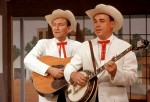On November 21, 1950, Lester Flatt and Earl Scruggs had their first recording session for Columbia Records.
During an afternoon session at The Tulane Hotel (Castle Studio) Nashville, Lester Flatt and Earl Scruggs – assisted by Curly Seckler [mandolin], Benny Sims [fiddle] and Jody Rainwater [bass] – recorded six songs: Come Back Darling, Head Over Heels In Love With You, I’m Waiting To Hear You Call Me Darling, The Old Hometown, I’ll Stay Around and We Can’t Be Darlings Anymore.
In the notes to the Bear Family Records first Flatt & Scruggs box set Flatt & Scruggs 1948 – 1959 (BCD 15472,) Neil V. Rosenberg says of the session …
“For their first session of November 21, 1950, with Columbia – a major label – the same band recorded in Nashville for the first time. Many of the songs and tunes in this set now are firmly identified by Flatt and Scruggs; more than a few have become well-known bluegrass warhorses. But it is not always easy to discover the full history of each song from the early days at Columbia. This is because in moving into the Nashville country music scene of the fifties they were plunging into a rapidly developing publishing industry. Country music had just discovered how lucrative the publishing game could be, and Nashville was like the Klondike in 1898, with much wheeling and dealing in song ownership. A key figure in the publishing (and recording) aspects of Flatt & Scruggs career during their first decade on Columbia was Troy Martin.
Martin, a former country music singer who’d recorded for the American record company (ARC) in the ‘30s, come to Nashville in 1949 to work for the New York-based publishing company, Peer-Southern, as a song plugger. His job was to get Peer songs on record. Martin soon became acquainted with Don Law, also newly arrived in Nashville, and help law in several ways – finding new performers and helping to produce recording sessions. Law reciprocated by directing publishing credits to Peer. When Don Law signed Flatt and Scruggs to Columbia, his company logbooks, which recorded the contract details for Flatt and Scruggs gave the band’s address as ‘c/o Troy Martin’ in Nashville.
At their first session they did six songs – three duets sung by Flatt and Seckler, two Flatt solos, and a high baritone trio in which Scruggs sang lead on the chorus. All were published by Peer, and Lester Flatt was given full credit as composer for all. Can’t be Darlings Anymore, was almost certainly not composed by Flatt and Seckler, even though their names appeared as composers on the record label. It had been recorded by George Morris and Leonard Stokes with J E Mainer and Snuffy Jenkins in 1937. Seckler had learned the song from Stokes with whom he had worked in the ‘40s. This claiming of old material for publishing purposes was not uncommon at that time. Performers felt this was justify by the work they had done in arranging and performing old material in a manner that made the ‘commercial’ for a new market. This is just one example of typical Nashville publishing practice of the time; others will be mentioned later it in the notes. There is no reason to suspect that the other five songs in this session will not newly composed. All were published by Peer, to whom Flatt and Scruggs were under contract as writers. Probably the best-known song from this session is I’m Head Over Heels in Love. Notice how Jody Rainwater’s descending bass line on this solo vocal by Flatt implies an E minor chord, especially during the first fiddle break. Flatt would develop the bluesy aspects by this in his early 1970s version for RCA Victor. I’m Waiting to Hear you Call Me Darling is a high baritone trio in F to which Scruggs contributed the lead vocal below Flatt and Seckler harmony. The mandolin, a central instrument in Monroe’s music, was never as important to the Flatt and Scruggs sound. Here Seckler contributes one of his rare mandolin solos. The Old Home Town dealt with a popular theme in post-war country music. Many southerners had recently moved to urban areas, and they treasured memories downhome childhood.
In this and the next three sessions of May 9, 1951, October 24, 1951, and November 9, 1952, and would retain the same instrumentation – Lester’s guitar and Earl’s banjo or lead guitar, Jody Rainwater’s bass, and mandolin and fiddle.
In the fall of 1950 the band moved from Tampa, Florida, to WVLK in Versailles, Kentucky, just outside of Lexington. In March 1951 mandolinist Curly Seckler left the Foggy Mountain Boys to join Rich-R-Tone artist the Sauceman Brothers. His place in the band was taken by West Virginian Everett Lilly of the Lilly Brothers. Lilly was the only Flatt and Scruggs sideman to receive billing on their record labels. Another change in the band personnel came when Lester and Earl’s old partner from the Monroe band, fiddler Chubby Wise, took Benny Sims’s place.”
Columbia Records released these recordings on three singles; Come Back Darling b/w I’m Waiting To Hear You Call Me Darling (4-20777), Head Over Heels In Love With You b/w We Can’t Be Darlings Anymore (4-20805) and The Old Home Town b/w I’ll Stay Around (4-20957).
http://www.youtube.com/watch?v=T9AslGxCLoEIn the 1980s The Bluegrass Album Band, J.D. Crowe, banjo, baritone vocal; Tony Rice, guitar, lead vocal; Doyle Lawson, mandolin, tenor vocal; Bobby Hicks, fiddle, bass vocal; Todd Phillips, bass; and Jerry Douglas, Dobro®, recorded four of those songs; We Can’t Be Darlings Anymore (on Volume 1), I’m Waiting To Hear You Call Me Darling (Volume 3), Head Over Heels In Love With You and The Old Home Town (Volume 4), and many are among today’s standards in the repertoire of jammers everywhere.
Many other bands have recorded these six songs.








